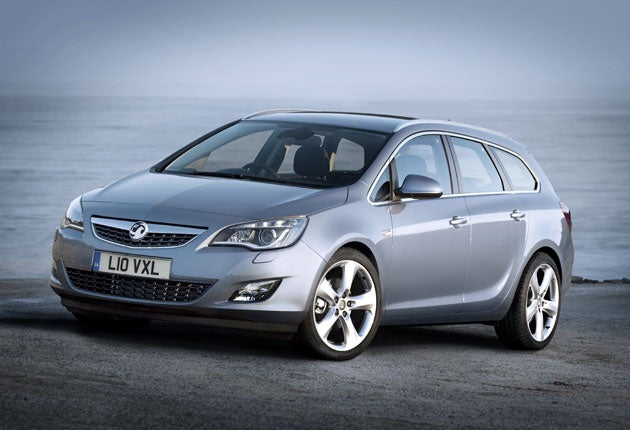Vauxhall Astra Sports Tourer
Forget its Opel alter ego, Vauxhall's svelte new estate – with its gem of an engine – is UK born and bred

Your support helps us to tell the story
From reproductive rights to climate change to Big Tech, The Independent is on the ground when the story is developing. Whether it's investigating the financials of Elon Musk's pro-Trump PAC or producing our latest documentary, 'The A Word', which shines a light on the American women fighting for reproductive rights, we know how important it is to parse out the facts from the messaging.
At such a critical moment in US history, we need reporters on the ground. Your donation allows us to keep sending journalists to speak to both sides of the story.
The Independent is trusted by Americans across the entire political spectrum. And unlike many other quality news outlets, we choose not to lock Americans out of our reporting and analysis with paywalls. We believe quality journalism should be available to everyone, paid for by those who can afford it.
Your support makes all the difference.Vauxhall. Do we still think of it as a British make? Or don't we really care, now that we're all European?
After all, for many years a Vauxhall has been almost exactly the same as a German Opel, with the V-word retained only for the UK market where it has always been a strong player. Very strong; the UK is General Motors' fourth-biggest market after China, the US and Brazil.
Well, think on this. To say a Vauxhall is a differently badged Opel might be true, but don't assume that that automatically makes it German. Unlike Ford, Vauxhall makes cars in the UK. Like Ford, it also does research and development here. And the car you see here is that now-unusual artefact, a mainstream-market, British-branded car not only built here but also engineered here.
Does it matter? Probably less than it should, but the new Astra Sports Tourer (an estate car by another name) is built at Ellesmere Port in Cheshire and nowhere else in the world. The work needed to make an estate car from an Astra hatchback starting point was also done in the UK. That is good news for buyers in mainland Europe, whose cars will wear Opel badges, because if a car works well on British roads it will work well almost anywhere.
Up until now, the estate car has been the Astra-range workhorse. But current thinking among marketing types is that every estate car must be as much a lifestyle-signifier as a carrier of loads, which is why – like the larger Vauxhall Insignia estate – it bears the Sports Tourer name and looks rather svelte.
There are some clever visual tricks at work. The upper side-window line falls more rapidly than the roof as it heads rearwards, hinting at a fastback profile, and the waistline rises to meet it. The rear pillars lean forwards and the rear window wraps round to meet them, disguising the estate-car upright tail, yet this Astra ST has more cargo volume than the Insignia.
This is a good-looking, upmarket-feeling estate car. This Astra is also a good advertisement for the power and realism of modern computer-aided design and engineering, because its new body pressings went straight from computer data to production tooling with not a single physical prototype in-between. That's an act of some faith.
You would buy this car, then, rather than an Insignia ST if you really wanted to carry bulky stuff. And if you bought a high-specification Astra, you could fold the rear-seat backrests down at the touch of a switch, and have a range of load-organising accessories.
Still, an estate car can only be deemed an engineering success if it remains good to drive despite its load-carrying ability. There are myriad engines, petrol and diesel, plus several trim levels and a price range from £16,600 to a heady £23,595, but it's the 1.4 Turbo petrol in the SRi trim level, costing £20,375, which really gels.
That SRi tag is a hangover from the 1980s, when the "i" signified sporty fuel injection, which every car now has, but it remains a favourite identifier of potentially entertaining Vauxhalls. Running on its standard 17in wheels, the SRi rides beautifully over bumps without the fidget that afflicts Astras running on the softer suspension but cursed with the optional fashion-victim 18in wheels. It also steers more sweetly. Vauxhall's engineers like this version the best too, but they were obliged to create the others to meet market demands.
And that little turbo engine is a gem, with its hefty 140bhp arriving at just 4,900rpm to ensure a punchy, effortless drive. CO2 is rated at 144g/km, which is a fair result for a car able to reach 62mph from rest in 9.5 seconds.
Verdict? Apart from its annoying electric parking brake it's a thoroughly likeable, very practical estate car with an unexpected hint of patriotic appeal. It's not often I can write that.
The Rivals
Hyundai i30 1.6 CRDi Premium: £17,150
Makes Astra seem expensive, and has a punchy, frugal diesel engine. Plush inside, well-equipped, quiet and comfortable, handles well.
Peugeot 308 SW 1.6 THP Sport: £19,445
Its 156bhp turbo is thirstier than Astra's but more powerful. Classy interior, comfortable and responsive, but styling is very challenging.
Renault Mégane 1.4 TCe Dynamique: £20,405
Another small, very efficient petrol turbo engine, 130bhp this time. But the car it powers, while pleasant enough, is really quite forgettable.
Join our commenting forum
Join thought-provoking conversations, follow other Independent readers and see their replies
Comments